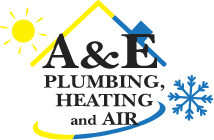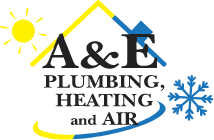
Choosing the right HVAC system can feel like an overwhelming task, especially when you’re faced with so many options and technical terms. Maybe you’re wondering if you’ll choose a system that doesn’t meet your home’s needs—or if you’ll spend too much on something that’s overkill. These are common concerns for homeowners, but with the right guidance, the process doesn’t have to be so daunting.
many options and technical terms. Maybe you’re wondering if you’ll choose a system that doesn’t meet your home’s needs—or if you’ll spend too much on something that’s overkill. These are common concerns for homeowners, but with the right guidance, the process doesn’t have to be so daunting.
At A&E Plumbing, Heating and Air, we’ve spent over 16 years helping homeowners like you navigate these tough decisions with confidence.
By the end of this article, you’ll have a clear understanding of how to evaluate your home’s needs, what factors to prioritize, and which HVAC system is likely the best fit for you. Whether it’s a central air system, a heat pump, or a ductless mini-split, you’ll be equipped to make an informed decision that brings comfort and efficiency to your home.
What Homeowners Should Know About HVAC Systems
Choosing the right HVAC system can seem daunting, but by breaking it down into key considerations, you can make an informed decision that fits your home, climate, and budget. Let’s explore what you need to know to get started.
1. Start with Your Home’s Current Setup
Your home’s existing infrastructure is a crucial factor in determining the best HVAC system.
- If your home has ductwork:
- Central air systems or heat pumps are often the most straightforward and cost-effective options.
- If your home doesn’t have ducts:
- Ductless mini-split systems are an excellent choice. They provide efficient heating and cooling without requiring costly duct installation.
- Consider your insulation:
- Homes with poor insulation can struggle to maintain temperature efficiently, leading to higher energy bills. Upgrading insulation or sealing leaks may be necessary to maximize your system’s performance.
Tip: If you’re reusing existing ducts, ensure they are properly sealed and insulated to prevent energy loss and save on utility costs.
2. Consider Your Climate
The climate you live in plays a significant role in which HVAC system is best for your home.
- Mild or temperate climates:
- Heat pumps are highly energy-efficient, providing reliable heating and cooling year-round.
- Hot climates:
- Central air systems are built to handle high cooling demands and are often the most effective choice.
- Cold climates:
- Pair a central air system with a furnace, or choose a dual-fuel heat pump system for efficient heating during harsh winters.
Tip: Heat pumps perform best in moderate weather. In extremely cold regions, a supplemental heating system may be necessary to maintain comfort.
3. Align Your Budget with Your Priorities
Your budget will guide your HVAC system choice, but it’s important to think beyond upfront costs.
- Upfront costs:
- Central air systems are generally the most affordable if ducts are already in place.
- Heat pumps and ductless systems often require a higher initial investment but offer significant long-term benefits.
- Operating costs:
- Energy-efficient systems like heat pumps and ductless mini-splits can reduce utility bills over time.
- Rebates and incentives:
- Many energy-efficient models qualify for rebates or tax credits, which can offset the higher initial cost.
Tip: Don’t feel like you have to choose between quality and affordability. Incentives and financing options can make premium systems more accessible.
4. Think About How You Use Your Home
Your daily habits and comfort preferences should influence your HVAC system choice.
- Do you want room-by-room control?
- Ductless mini-splits are ideal for zoning, allowing you to heat or cool specific areas without wasting energy on unused spaces.
- Do you prefer whole-home consistency?
- Central air systems or heat pumps provide even cooling and heating throughout your home.
- Are air quality concerns a priority?
- Systems with advanced filtration can improve indoor air quality, reducing allergens, dust, and pet dander.
5. Maintenance and Longevity
Every HVAC system requires maintenance, but some are easier to care for than others.
- Central air systems:
- Require occasional duct cleaning and annual inspections to ensure optimal performance.
- Heat pumps:
- Need regular servicing to maintain their energy efficiency, especially in extreme climates.
- Ductless mini-splits:
- Filters need frequent cleaning, but these systems tend to have long lifespans with proper care.
Tip: Routine maintenance not only prevents expensive repairs but also extends the life of your system, keeping it efficient for 10–15 years or more.
3 Simple Steps to Make Your HVAC Decision
Choosing the right HVAC system doesn’t have to be overwhelming. By breaking it into three straightforward steps, you can ensure you’re making an informed and confident choice that fits your home, budget, and lifestyle.
Step 1: Make a List of Priorities
Start by identifying what’s most important to you in an HVAC system. This will help you focus on options that align with your specific needs.
Cost
Are you looking for the most affordable upfront option, or are you willing to invest more initially for long-term savings?
Efficiency
How important is energy efficiency in reducing utility bills and your environmental footprint?
Comfort
Do you need whole-home consistency, or do you want the flexibility of room-by-room temperature control?
Air Quality
Do you need advanced filtration for allergies, dust, or pet dander?
Tip: Writing down your priorities can help you stay focused during the decision-making process, especially when comparing multiple systems.
Step 2: Talk to a Professional
Getting advice from an HVAC professional is one of the most valuable steps you can take. They bring expertise that ensures your choice is tailored to your home’s unique requirements.
expertise that ensures your choice is tailored to your home’s unique requirements.
Schedule a Home Energy Audit
This can identify inefficiencies, such as leaky ducts or poor insulation, that might affect your system’s performance.
Ask for Recommendations
A professional can explain which systems are compatible with your home and help you weigh the pros and cons of each option.
Common Concern: “Won’t they just try to sell me the most expensive system?”
A reputable HVAC professional prioritizes your needs and budget over upselling. Always ask for a detailed explanation of their recommendations.
Step 3: Explore Your Options
Once you have a clearer idea of your priorities and professional guidance, it’s time to compare options and finalize your decision.
Rebates and Incentives
Many energy-efficient models qualify for rebates or tax credits that can lower your initial costs. Ask your provider for details.
Warranties
Look for systems with strong warranties on both equipment and installation. A longer warranty offers added peace of mind.
Financing Plans
Many companies offer payment plans that make it easier to afford a high-quality system without a large upfront expense.
Tip: Don’t hesitate to get multiple quotes and ask questions about pricing and features to ensure you’re getting the best value.
Choosing Comfort Made Simple
When you started reading, you might have felt uncertain about where to begin with such an important decision. You may have worried about selecting the wrong system, overspending, or missing out on features that truly matter for your home and comfort.
decision. You may have worried about selecting the wrong system, overspending, or missing out on features that truly matter for your home and comfort.
With over 16 years of expertise in HVAC systems, we aim to make the decision-making process simple and stress-free for homeowners like you. If you’re still unsure about the next step, a trusted HVAC professional can help you evaluate your priorities and guide you toward the best solution for your needs.
Your journey to finding the perfect HVAC system is well underway, but there’s still an important step ahead. Before finalizing your new system choice, it’s crucial to know exactly what to expect in a quote. A detailed quote not only ensures transparency but also helps you avoid hidden costs and costly mistakes.
Take the next step in your HVAC journey with our guide, What’s Included in an HVAC System Quote, and gain the confidence you need to move forward with peace of mind.
Daphne Hunt holds a bachelor's degree in English and Mass Communication and has a lifelong passion for writing. She thrives on using her skills to craft compelling pieces that inform, inspire, and connect with readers.


